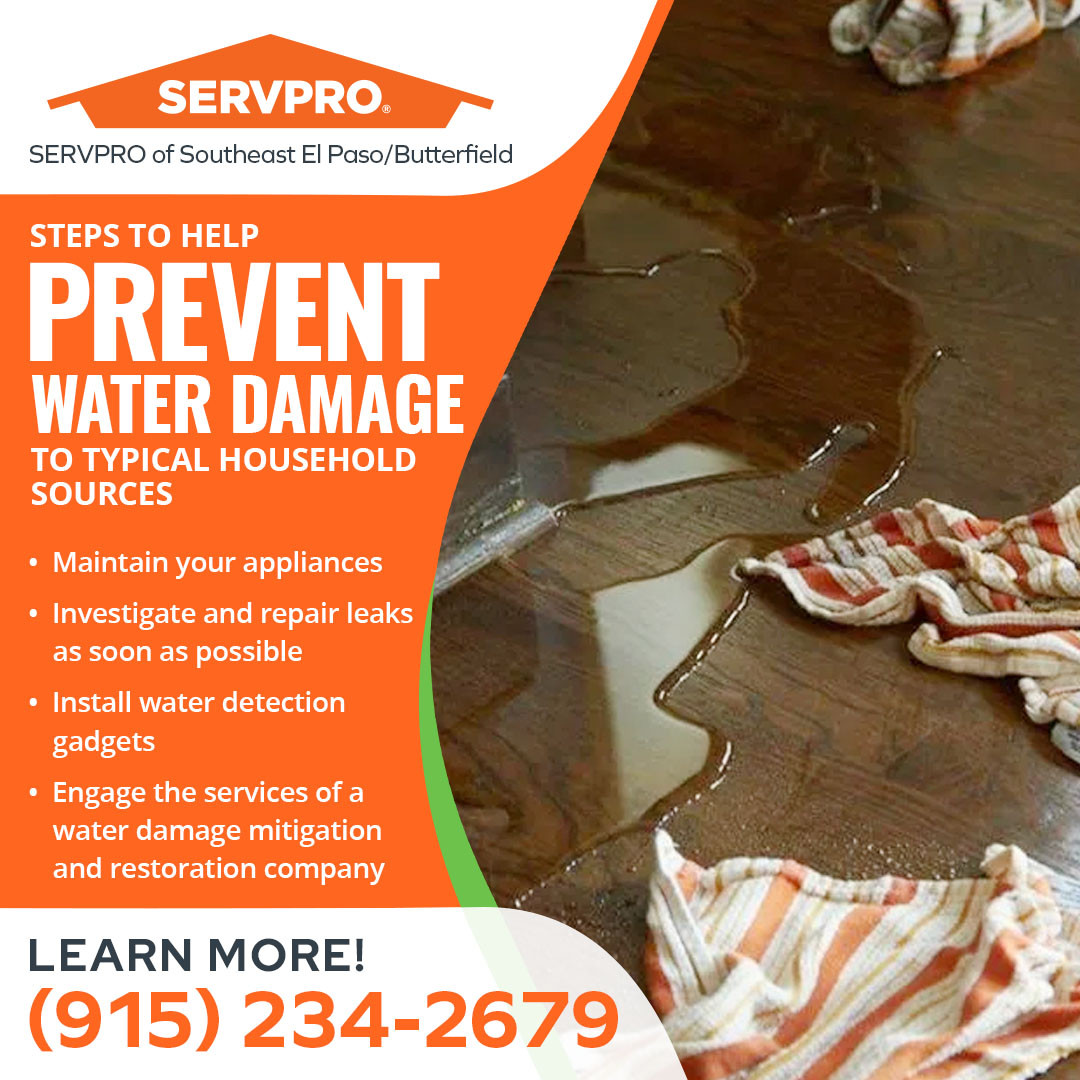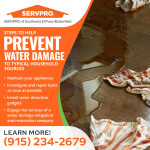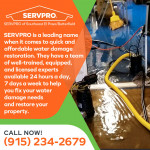Water damage is the second-most commonly reported claim on a homeowner's insurance policy. Many people leave their houses for hours every day. Some travel for days, weeks, or even months for vacations and work.
Consider how you'd feel if you returned home from a weekend getaway or work convention to find water in your basement or water rushing down your stairs with everything soaked. That’s how dangerous water damage can be, which is why it should be taken seriously.
The good news is that there are steps you can take to protect yourself from costly water damage and claims.

The experts at SERVPRO of Southeast El Paso/Butterfield, a leading water damage restoration company in El Paso, have put together the following steps to help prevent water damage to typical household sources.
1. Maintain your appliances
The most prevalent source of water damage in the home is appliances. Check and maintain your appliances for leaks regularly, as directed by the manufacturer.
Here are some of the common issues with various appliances:
- Refrigerator: During the summer, your refrigerator is going to produce a lot of moisture. As warm air passes over the condenser coil when the door is opened, moisture accumulates at the bottom and spills out onto the floor.
To prevent this, clean the refrigerator condenser coil before the weather warms up. This will cut your monthly electricity bill while also reducing the possibility of an overflow caused by dirt accumulation.
- Dishwasher: A malfunctioning or wrongly used dishwasher can cause massive water damage if left for too long. Too much detergent, the wrong sort of detergent, or other factors could cause your dishwasher to leak. Due to the volume, the subsequent water damage is more akin to flood damage.
- Washing Machine Leaks: A washing machine leak can be a dramatic and costly experience. A water leak is usually caused by a hose connection, gasket, seal, or pump. The machine can also spill a large volume of water if used improperly.
- Hot Water Heater: Your water heater is amongst the top culprits of water damage in your home. You can avoid leaks and costly repairs to the water heater with a simple investment in an annual examination. As your heater ages, keep an eye out for corrosion and other issues and replace it every 10 years.
- Air Conditioning: Your air conditioner has most likely kept you warm in the winter and cool in the summer, but it could be a source of water damage if not properly maintained.
The air conditioner removes surplus moisture from the air in your home. However, if the ducts become clogged, moisture will gather inside them. The water then runs down to the floor, causing damage. To avoid water damage, make sure you take good care of your air conditioner and replace the filters regularly.
Other Steps to Take
2. Investigate and repair leaks as soon as possible
If you discover evidence of a leak anywhere in your home, act quickly to investigate. There could be mold or dry rot, mildew, or even structural damage if you don't pay attention to moisture damage or don't do important repairs when they're due.
3. Install water detection gadgets
A water detector is a small electronic gadget with a sensor that detects wetness and sounds an alarm. Its key advantage is that it can detect low moisture levels or slow leaks that go undiscovered most of the time. To avoid major damage and mold growth, place it near water heaters, washing machines, sump pumps, dishwashers, toilets, and others.
4. Engage the services of a water damage mitigation and restoration company
If you encounter any form of water damage, you need to act as soon as possible. Contact a water damage restoration company like SERVPRO of Southeast El Paso/Butterfield.

SERVPRO is a leading name when it comes to quick and affordable water damage restoration. They have a team of well-trained, equipped, and licensed experts available 24 hours a day, 7 days a week to help you fix your water damage needs and restore your property.
Call SERVPRO of Southeast El Paso/Butterfield right now at (915) 234-2679 to speak to a water restoration expert.






















